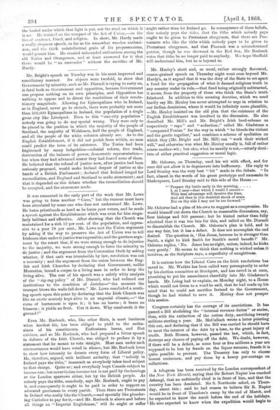Even Mr. Roebuck, who, like other flints, is most luminous
when hardest hit, has been obliged to yield to the enthu- siasm of his constituents. Enthusiasm burns, and ffint calcines, and so Mr. Roebuck, who had prepared a bitter speech in defence of the Irish Church, was obliged to preface it by a statement that he meant to vote straight. Most men under such circumstances would have voted in silence, but Mr. Roebuck loves to show how intensely he detests every form of Liberal policy. He, therefore, argued, with brilliant audacity, that "nobody in Ireland pays the tithe," inasmuch as everybody takes land subject to that charge. Quite so ; and everybody buys Consols subject to income-tax; but nevertheless income-tax is not paid by the herrings or the London sparrows either, but by the British people. As nobody pays the tithe, somebody, says Mr. Roebuck, ought to pay it, and consequently it ought to be paid in order to support an educated gentleman in every parish. Then there are Protestants in Ireland who really like the Church,—and specially like plunder- ing Catholics to pay for it,—and Mr. Roebuck is above and before all things an "Imperial Englishman," will do aught or suffer
!aught rather than let Ireland go. In consequence of these beliefs, that nobody pays the tithe, that the tithe which nobody pays ought to be given to Protestant clergymen, that there are Pro- testants who like the tithe which nobody pays to be given to Protestant clergymen, and that Pharaoh was a misunderstood patriot, though he was drowned in the Red Sea, Mr. Roebuck votes that tithe be no longer paid to anybody. We hope Sheffield will understand him, but he is beyond us.






























 Previous page
Previous page